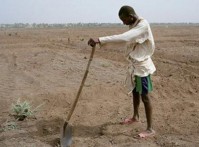Climate-driven migration challenge underestimated
 The world’s governments and relief agencies need to plan now
The world’s governments and relief agencies need to plan nowto resettle millions of people expected to be displaced by climate
change
A
new
target=”_blank”>report from the UK government-backed
Program says the challenges of migration due to climate change
will be greater than previously estimated.
Earlier reports assumed mass migration away from affected areas
- the UN estimates an average of 25 million people a year have been
displaced due to weather-related events since 2008.
This new study also looks at the millions who will migrate into
vulnerable areas, and those who will be trapped and unable to move
to safer locations.
The Foresight Program estimates there will be between 154 and
179 million people living in rural coastal floodplains by 2060 who
will be unable to move away due to poverty.
The report’s main findings are that:
- Millions will be ‘trapped’ in vulnerable areas and unable to
move, particularly in low-income countries. Migration is
costly, and with environmental conditions such as drought and
flooding eroding people’s livelihoods, migration - particularly
over long distances - may be less possible in many situations. This
creates high risk conditions. - People will increasingly migrate towards environmentally
vulnerable areas. Rural to urban migration is set to continue,
but many cities in the developing world are already failing their
citizens with flooding, water shortages and inadequate housing.
Preliminary estimates show that up to 192 million more people will
be living in urban coastal floodplains in Africa and Asia by 2060,
through both natural population growth and rural-urban
migration.
- However, migration can transform people’s ability to cope with
environmental change,opening up new sources of income which help
them become stronger and more resilient. For instance, 2009
remittances to low income countries were at $307 billion, nearly
three times the value of overseas development aid. These kinds of
income flows may actually make it possible for households,
particularly in low income countries, to stay in situ for
longer.
The report recongizes that policies to restrict or prevent
migration are risky, and the cost of doing nothing will be higher
than the cost of the measures needed tackle migration
challenges.
Professor Richard Black, chair of the project’s Lead Expert
Group and Head of the School of Global Studies and Professor of
Geography at the University of Sussex said “This report is
unique in both its substantial evidence base and in its global
approach, and will provide policy makers and others in the
environment and development
fields with a firm basis upon which to tackle the migration
challenges of the future.”
The crisis of climate refugees has policy implications in
Canada. A 2010 Parliamentary Report:
target=”_blank”>Climate Change and Forced Migration: Canada’s
Role outlines Canada’s position with regards to climate
refugees.
The report acknowledges the growing challenges of mass migration
and the need to increase the number of refugees admitted to Canada
each year. It also points out that climate refugees are different
than traditional refugees.
The report states that: “For climate migrants, repatriation may
be a good option because, unlike traditional refugees, climate
migrants technically still enjoy the protection of their own
governments. Therefore, the issue is perhaps less about refugees
than it is about expanding foreign aid to help developing countries
adapt to climate change.”
The Executive Summary of the Report is available for
download
target=”_blank”>here.
You can return to the main Market News page, or press the Back button on your browser.

